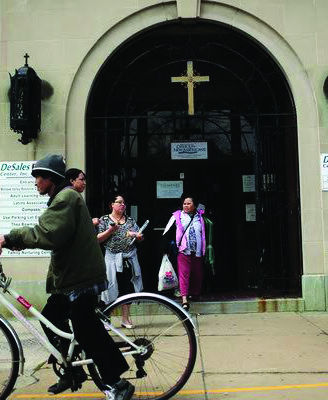Mohawk Valley Resource Center Addresses Refugee Health Issues

MVRCR helps thousands of refugees adjust to life in America.
On Thursday, March 24, students gathered in Lathrop Hall for the brown bag “Refugee Health,” which featured a presentation about managing refugee health in local and global contexts. The presentation was delivered by Jennifer VanWagoner and Beth White, representatives from the Mohawk Valley Resource Center for Refugees, located in Utica, N.Y. VanWagoner currently serves as the Manager of Grants and Community Engagement for the resource center, while White is the center’s Health Access Coordinator. Over 30 students attended the presentation.
VanWagoner started her presentation by highlighting the fact that over 60 million people are currently displaced by conflict and war worldwide. She explained that refugees face significant challenges during the resettlement process. Refugees often wait anywhere from 18 to 24 months between their referral for resettlement in another country until their actual placement in that country. VanWagoner stated that the Mohawk Valley Resource Center for Refugees (MVRCR) does everything it can to assist these displaced populations and particularly serves refugees from Myanmar, also known as Burma, and Somalia who have fled their countries and moved to Central New York. The Utica-based organization has resettled over 16,000 refugees throughout its history.
Next, VanWagoner discussed issues of health that affect refugees during the immigration process to Central New York. Refugees are required to go through pre-arrival and post-arrival screenings, which screen for mental and physical health issues.
After going through the formal immigration application process in their home countries, refugees face
significant health-related issues upon arrival in Central New York. VanWagoner also cited refugees’ lack of understanding of Western medicine as a huge concern of the MVRCR staff. She acknowledged that many refugees are accustomed to using natural remedies instead of artificial medication commonly used in the United States. She informed the audience that literacy and fluency in English is also a concern. To illustrate this point, VanWagoner provided the example of a refugee who did not speak English very well and did not know how to read labels on a medication bottle. As a result, this woman did not take the correct dosage of her prescribed medication. The MVRCR attempts to avoid these situations by keeping translators readily available to refugees and by inviting refugees to participate in vital cultural relevancy training.
One of the responsibilities of the Mohawk Valley Resource Center for Refugees is to inform refugees of the health risks of eating fast food, which could cause health problems like hypertension and diabetes. VanWagoner explained that many Somali would come to the U.S. and eat at McDonald’s because of its low cost. Most Somali refugees are not fully aware that this cheap and unhealthy food could seriously damage their health.
Senior Katrina Bennett was impressed by the ways in which the Mohawk Valley Resource Center for Refugees attempts to incur positive change in the Central New York refugee community.
“I always enjoy hearing about the wonderful work that the Mohawk Valley Resource Center for Refugees is doing. I think that every Colgate student should become involved with the center in some capacity, or at least become familiar with its work. There is so much that the center, its staff members and the unique individuals it serves can teach all of us,” Bennett said.
Senior Emily Luba was struck by the Mohawk Valley Resource Center for Refugees’ approach to healthcare.
“I think that the Mohawk Valley Resource Center for Refugees works to address the complexity of healthcare across borders, both literally and figuratively. I think it’s important to deconstruct and challenge the idea that the only approach is a Western model,” Luba said.



